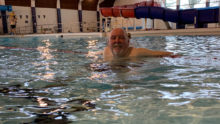
How swimming sessions are proving to be valuable for those living with dementia
08/11/2019A new report commissioned by Swim England has revealed how swimming is helping to make huge savings for the NHS and social care system, especially treating those living with dementia.
Peter Scott says that dedicated swimming sessions are helping him ‘live well with dementia’.
The 73-year-old is one of several people who attend Dementia Friendly Swimming sessions at Ripley Leisure Centre in Derbyshire.
Once a week, the pool is closed to the public so Peter and others are able to enjoy the mental and physical health benefits of swimming in a calm, serene space, alongside family, carers or leisure centre staff.
The benefits are clear to see.
New research from Swim England has revealed that sessions like these are helping to save the NHS and social care system £139,546,106 a year nationally in treating those living with dementia.
The Value of Swimming report states more than £10.9 million is saved from dementia care in the East Midlands alone.
Other key highlights from the report include:
- Swimming saves the health and social care system £27,912,478 in the East Midlands.
- The second largest savings (£7,803,601) in the East Midlands is for coronary heart disease and strokes.
- Other key savings are made in reduced GP visits (£3,981,771), diabetes (£2,920,803), colon cancer (£813,800), depression (£741,140) and breast cancer (£766,767).
- Swimmers report feeling on average 6.4% healthier than non-swimmers – this is comparable to feeling 12 years younger
- Adults who swim were 4.3% happier than non-swimmers.
- The report highlights how swimming particularly benefits women and girls, more than doubling their self-confidence
- Whilst in the last 12 months 14 million adults went swimming, the benefits to the nation could be even greater if progress can be made amongst the 1 in 3 adults in England that cannot swim
- Swimmers are more likely to be socially connected – and 26.7% less likely to have no friends compared to non-swimmers
For Peter and his friends at Ripley Leisure Centre, the sessions are a lifeline.
He said: “Since I have dementia, I cannot cope with a lot of noise and a lot of people around me.
“This is ideal. I can swim safely as I know there is someone looking after us.
“I’ve got my own lane now, so I can swim without being impeded at all. It’s just enjoyable. It’s keeping us fit and we meet other people who have got similar conditions.
“This was very important for me, otherwise I wouldn’t be swimming at all. The environment that it is, is a life saver for me.
“I’m not suffering from dementia, I’m living well with dementia.”
Smiling, chatting and laughing while they swim
In total, swimming and other water-based activity helps save the NHS and social care system £357 million a year.
The Value of Swimming research also shows how more than £51 million nationally is saved from reduced GP and psychotherapy visits of adult swimmers compared to non-swimmers.
Ripley Leisure Centre manager Jenny Hedgecock believes more medical professionals need to start advising people of the mental and physical health benefits of swimming.
She said: “The majority of our swim participants have not come to us via a medical professional or GP route so potentially there is a lot more to be done to promote the health benefits of swimming for people living with dementia.
“Spreading the word of what physical activity is suitable and what other activities are available for people living with dementia is currently disjointed or fragmented.
“We know swimming is extremely beneficial – you only have to look at the faces of those swimming.
“They are smiling, chatting and laughing while they swim.
“It gives them the opportunity to be physically active in a safe and secure environment.
“We’ve witnessed improvements in water confidence and swimming ability and the families have also confirmed how much more relaxed their loved ones are after swimming.
“Some participants have also mentioned that their mobility is improving and that their blood pressure is dropping.
“It’s also important to note that having a cuppa and chat after the swim session is equally important from a social engagement and interaction point of view for all of those living with dementia – it allows them the opportunity to share experiences.”
Jenny’s message to anyone living with dementia, their families or carers who are thinking of going swimming is simple.
“Just try it,” she said. “People living with dementia benefit from having a weekly routine.
“Being physically active needs to be part of that routine.
“Our swim sessions have given people that chance as well as giving them the opportunity to make new friends.”
 Just Swim
Just Swim



